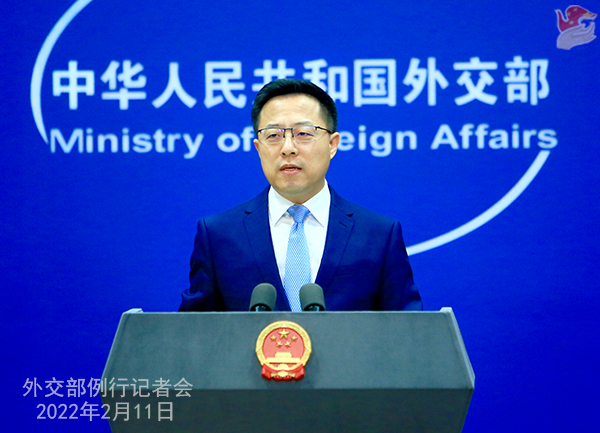
CCTV: The Beijing Olympic Winter Games are in full swing. For days, leaders of many countries and heads of international organizations have spoken highly of China’s sense of responsibility as a major country represented by efforts to uphold the Olympic spirit and promote humanity’s solidarity and friendship. They believed that the successful Beijing Olympic Winter Games has presented the sunny, prosperous and open image of China in the new era and made key contribution to the advancement of the Olympic movement. What is your comment?
Zhao Lijian: As you said, China is fulfilling its commitment to hosting a streamlined, safe and splendid Olympic Games. The international community is seeing a crescendo of recognition and praises of the Beijing Olympic Winter Games. Many political figures in the world have noted that Beijing 2022 will help to demonstrate humanity’s resilience, solidarity and pursuit of happiness, and stands as a vivid example of the Olympic spirit of “together”. The successful opening of Beijing 2022 amid COVID-19 has shown China’s strong organizational capabilities. Some international guests at the opening ceremony of the Olympics have also given a thumbs-up to what they witnessed, and spoken highly of the preparation for the events.
Here are some examples I’d like to share with you. IOC President Thomas Bach said, Beijing 2022 “will open a new era for winter sports globally” and “There will be a different winter sports world after these Games” with the engagement in winter sports by 300 million Chinese people. President Abdulla Shahid of the United Nations General Assembly noted that Beijing 2022 will be an important opportunity to go beyond geopolitics and promote global solidarity, peace and human ingenuity. King Norodom Sihamoni of Cambodia said that the hospitality of the Chinese people is going to leave a deep impression on athletes competing in the Games. President Aleksandar Vučić of Serbia expressed “thanks to the thoughtful and warm reception from the Chinese side” and said that “We deeply appreciate the sincerity and friendliness of the Chinese people”. President Gurbanguly Berdymukhamedov of Turkmenistan noted that the Beijing Winter Olympics will be held at the highest organizational and sporting level. Sheikh Mohammed bin Zayed Al Nahyan, Crown Prince of Abu Dhabi of the UAE tweeted in Arab, Chinese and English that “the 2022 Winter Olympics in Beijing embody the power of sport to promote understanding and friendship among the people of the world.” Prime Minister Imran Khan of Pakistan said, “To hold Olympics during the pandemic is one of the most difficult things to do. The only way that one country could do it is that it must have incredible discipline” and China made it.
As we speak, many Olympians are going all out to compete against each other in venues and stadiums not too far from us. We wish all athletes to impress the world, out-compete themselves and realize their dreams in Beijing. We are sure that excitement will build up as the Games continue.
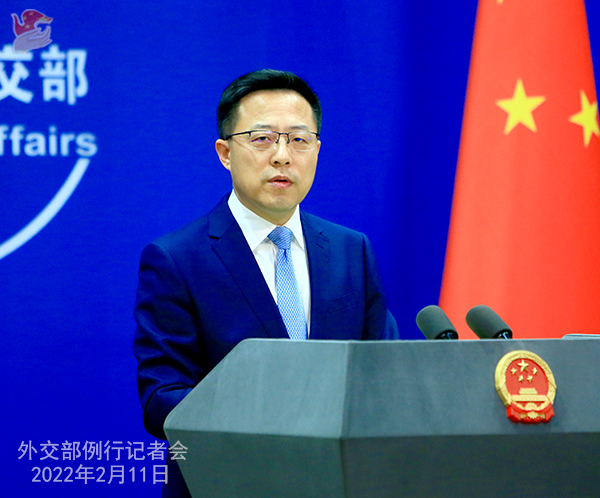
Bloomberg: US Secretary of State Antony Blinken said on Friday that China had been acting more aggressively both at home and in the region. But he added that he didn’t consider a conflict in the Indo-Pacific region as inevitable. Does the foreign ministry have a comment?
Zhao Lijian: The remarks made by the US politician are nothing but a rehash of political lies. China is firmly opposed to such remarks by the US side.
The US is playing up the “China threat” theory in order to smear, oppress and contain China’s development. This fully exposes the deeply-entrenched Cold War mentality and ideological bias of the US side. Speaking of acting aggressively in this region and beyond, the US is second to none.
Shenzhen TV: According to reports, US Secretary of State Blinken will visit Fiji on February 12, which will be the first visit to the country by a US Secretary of State since 1985. Some reports say with relations between China and Pacific island countries growing rapidly in recent years, Blinken’s visit aims to push back against China’s growing influence in the region. Do you have any comment?
Zhao Lijian: I noted that as you mentioned, this will be the first visit to Fiji by a US Secretary of State in 37 years. I did some homework before today’s press conference on Chinese leaders’ visits to Fiji since 1985. I can tell you that more than 20 Chinese leaders and senior officials above the foreign minister level have visited Fiji since 1985.
In recent years, the comprehensive strategic partnership between China and Pacific island countries has developed rapidly and steadily. With political mutual respect, economic mutual support and cultural affinity, the two sides have set a good example of friendship, solidarity and cooperation between countries in different regions, of different size, and with different cultures. In developing relations with Pacific island countries, China always treats all countries, big or small, as equals, upholds justice while pursuing shared interests, and follows the principle of sincerity, real results, affinity and good faith. China is committed to building a community with a shared future with Pacific island countries, which has been warmly welcomed by the governments and people of these countries.
In the wake of the recent disastrous volcanic eruption in Tonga, China acted swiftly and provided emergency assistance through multiple channels. When rioting broke out in Solomon Islands in November last year, China provided firm and strong support to the country in fighting violence, curbing chaos, maintaining social stability, and protecting people’s safety. Recently, as the COVID-19 situation suddenly worsened in many island countries, China has overcome difficulties in transportation and sent a large number of anti-epidemic supplies and medical equipment by sea and air to ease their immediate difficulties. All these are true reflection of China and island countries offering each other assistance and sharing weal and woe.
I want to stress that the development of relations between China and Pacific island countries is open, transparent, inclusive, and not targeted at any third party. We hope all countries can take concrete actions to help Pacific island countries deal with challenges and do more to contribute to regional peace, stability and development.
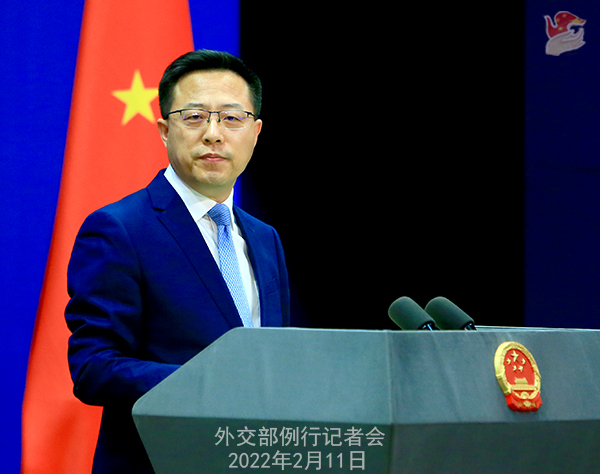
Reuters: According to reports in Australian media, Chinese spies sought to fund candidates for Australia’s opposition Labor party in an upcoming federal election. The Chinese spies, according to these reports, were stopped by the Australian security agency. Do you have any comment on these reports?
Zhao Lijian: I noted the above-mentioned reports, which are not worth refuting at all. I believe you may have noticed that some people in Australia have criticized such remarks as reckless and purely for political gain.
I want to reiterate that China is committed to developing relations with other countries on the basis of mutual respect and non-interference in each other’s internal affairs. China has no interest in and has never interfered in Australia’s internal affairs. We urge certain politicians and institutions in Australia not to make an issue out of China.
Hubei Media Group: On February 10, a spokesperson for Australia’s Department of Foreign Affairs and Trade (DFAT) confirmed in an interview with an Australian media outlet that the Department has been beefing up diplomatic and legal teams in Canberra and Vienna to work on the response to the legal, regulatory and political repercussions of AUKUS and the nuclear-powered submarine cooperation. The three countries involved has reiterated their respective commitment to non-proliferation and noted “We expect all members of the international community to act responsibly and to engage in the accurate dissemination of information, not disinformation or misinformation”. What is China’s comment?
Zhao Lijian: China has expressed its grave concern about and firm opposition to nuclear-powered submarine cooperation under the AUKUS framework announced by the US, the UK and Australia on multiple occasions. We believe that this is a deliberate move that escalates regional tension, provokes an arms race, threatens regional peace and stability and undermines international nuclear non-proliferation efforts. An increasing number of countries have expressed concern over the possible repercussions of the cooperation of the US, the UK and Australia.
The nuclear-powered submarine cooperation involves the transfer of a large amount of weapons-grade nuclear material from nuclear-weapon states to a non-nuclear-weapon state. But there is nothing in the IAEA safeguards mechanism that can effectively monitor such transfer, thus posing a great risk of nuclear proliferation and severely impacting the international non-proliferation system. Under China’s proposal, the IAEA Board of Governors added issues related to the trilateral nuclear submarine cooperation to the meeting’s official agenda in November 2021, which fully reflects the grave concern shared broadly by member states of the Board of Governors. China has suggested that the IAEA launch a special committee open to all member states to focus on discussing the political, legal and technical issues concerning the cooperation, and to properly seek a solution acceptable to all parties. The US, the UK and Australia should not proceed with relevant cooperation, and the IAEA Secretariat should not have consultation with the three countries on the so-called safeguards arrangement for their nuclear submarine cooperation until consensus is reached by all parties.
In disregard of the international community’s concerns, the US, the UK and Australia have obstinately advanced nuclear submarine cooperation. This fully exposes their double standards on the non-proliferation issue and will have profound negative impact on the resolution of regional nuclear hotspots including the Iranian nuclear issue and the Korean Peninsula nuclear issue. The relevant cooperation may also open the Pandora’s Box and prompt other non-nuclear weapon states to follow suit, which will gravely undermine the international nuclear non-proliferation system. It is clear to all who is irresponsible. China urges the three countries to adopt a responsible attitude toward the international community’s concerns, rescind their erroneous decision, fulfill non-proliferation obligations with concrete actions rather than saying one thing and doing the complete opposite.
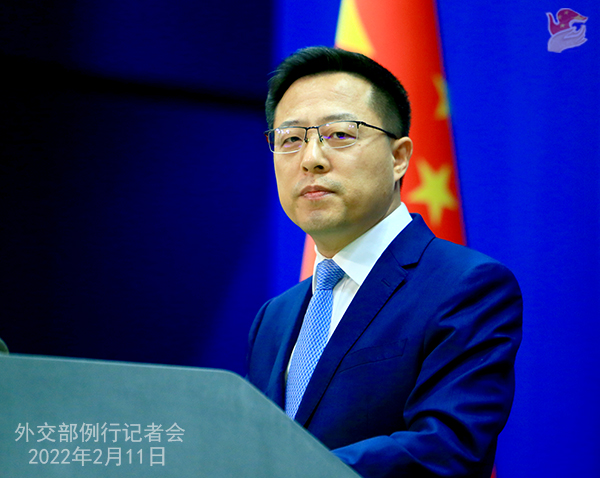
Phoenix TV: Due to disputes in public opinion between China and the ROK recently, a Chinese student studying in the ROK was attacked by ROK citizens. What is China’s response?
Zhao Lijian: We are closely following the incident. The Chinese Consulate General in Busan has contacted the person concerned to learn about the situation and provided active assistance, coordinated with the local police and asked them to conduct an investigation and will continue to follow up on it. We will do our utmost to protect the legitimate rights and interests and personal safety of Chinese citizens overseas.
AFP: The top diplomats of the US, Australia, Japan and India opened talks on deepening their Quad alliance, saying that countries need to stand up to those who seek to coerce them and raising a long-term issue of China’s rising power. Does the foreign ministry have any comment?
Zhao Lijian: I have expounded on our position on the Quad for many times. I also made a response specifically on this subject the other day.
China believes that the so-called Quad group cobbled together by the US, Japan, India and Australia is essentially a tool for containing and besieging China to maintain US hegemony. It aims to stoke confrontation and undermine international solidarity and cooperation.
I want to stress that as the Cold War is long over, the attempt to forge a so-called alliance to contain China wins no support and leads nowhere. Relevant countries should abandon the antiquated Cold War mentality, correct the wrong approach of bloc confrontation and geopolitical games, and contribute to peace and stability in the Asia-Pacific.
Beijing Youth Daily: According to reports, Japanese Prime Minister Fumio Kishida said while delivering a speech in Tokyo on February 7 that Japan seeks to hold persistent consultations with Russia to resolve the territorial issue. The newly-appointed US Ambassador to Japan Rahm Emanuel emphasized in a video message posted on the same day that the US supports Japan on the territorial issue. The Russian Foreign Ministry immediately criticized the US statement on the issue of the southern Kuril Islands. Does China have any comment?
Zhao Lijian: I’ve noted relevant reports. The issue of the southern Kuril Islands is a bilateral issue between Russia and Japan. It should be properly resolved by the two sides. It is China’s consistent belief that the outcomes of the victory of the Anti-Fascist War should be earnestly respected and upheld.
Phoenix TV: Two questions that both have something to do with Japan. First, Taiwan confirmed that Tsai Ing-wen and former Japanese Prime Minister Shinzo Abe had a phone conversation in January, during which she thanked Abe and the Japanese government for their support to Taiwan. Does the foreign ministry have any comment? Second, the ROK President expressed regret over Japan’s bid to have a group of gold mines on Sado Island registered as a UNESCO World Cultural Heritage site, saying it is “unnerving” to have a new historical issue. Do you have any comment?
Zhao Lijian: On your first question, Taiwan is an inalienable part of China’s territory. China firmly opposes official interaction in any form between countries having diplomatic ties with China and Taiwan. We solemnly urge certain Japanese politicians not to harm China’s sovereignty in any way and not to send wrong signals to "Taiwan independence" forces in any way. We also have this solemn warning to Taiwan authorities: all attempts to advance its agenda by soliciting foreign support are doomed to fail.
On your second question, we responded to related questions on other occasions. Forced recruitment and enslavement of laborers is a grave crime committed by the Japanese militarism during its overseas aggression and colonial rule. In a similar bid previously, Japan admitted that there was forced labor at some of these sites involving workers from China, the Korean Peninsula and other Asian countries, and promised to set up an information center to honor the victims, but it never fulfilled the promise. Now ignoring the painful memories of its neighbors, Japan is trying to make a similar new bid, which will only trigger stronger indignation and opposition. Japan should face up to history, adopt an honest and responsible attitude and take concrete actions to properly handle issues left over from history and win the trust of its Asian neighbors and the international community.
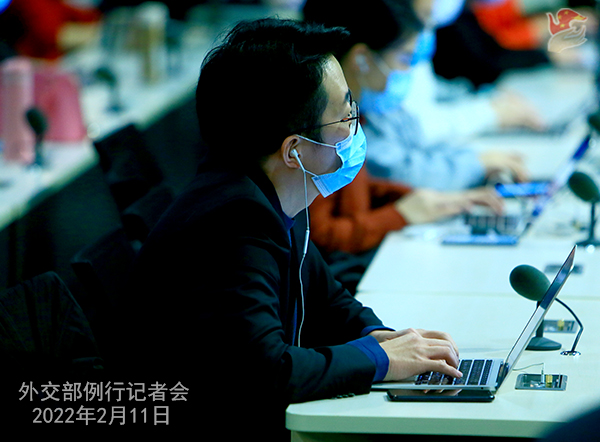
Associated Press of Pakistan: Prime Minister Imran Khan in an interview with Mr. Li, Director of the Advisory Committee of China Institute of Fudan University, said that Belt and Road Initiative can help Pakistan lift its people out of poverty. He noted “we see CPEC and Gwadar as a great opportunity for our geoeconomics. I think this is not exclusive between Pakistan and China. We invite any other country to join and invest in CPEC projects”. What is China’s comment on this?
Zhao Lijian: We appreciate Prime Minister Imran Khan’s remarks. As an important pilot project of the Belt and Road Initiative (BRI), the China-Pakistan Economic Corridor (CPEC) upholds the principles of extensive consultation, joint contribution and shared benefits. Since its inception, it has boosted economic development, improved people’s livelihood and generated positive socioeconomic effects. China is ready to work with Pakistan to follow through on the consensus reached by the leaders, deepen CPEC’s development, ensure smooth implementation of major projects, expand cooperation in science and technology, agriculture and livelihood, build a corridor for green development, health and digital economy, and make CPEC a demonstration program of high-quality development under the BRI.
China and Pakistan welcome all countries and international organizations that support the BRI and CPEC, and hope to conduct mutually beneficial cooperation with China and Pakistan for common development to participate in CPEC’s development on the basis of consensus to share in the benefits of development.
Beijing Daily: According to reports, US Secretary of State Blinken said in an interview with Australian media outlets that China’s trade sanctions on Australia have backfired and by standing up to Beijing, Australia “set an incredibly powerful example” for the world. “I think China has lost more than Australia has in its efforts to squeeze Australia economically,” he said, adding that Beijing would be “thinking twice about this in the future”. Does the Chinese side have any comment?
Zhao Lijian: With regard to “coercion”, no one has a better claim to the title of “master of coercion” than the US. Speaking of “coercion”, the US government forced the military government of Haiti to step down in 1994, and referred to that as “a textbook example of coercive diplomacy”. In 2003, it explicitly characterized $30.3 billion additional military expenses for “coercive diplomacy” as incurred expenses. The US government went all out to hobble competitors like Huawei of China, Alstom of France and Toshiba of Japan and used coercion to force the Taiwan Semiconductor Manufacturing Co (TSMC), Samsung and other companies to provide chip supply chain data. These are textbook examples of economic coercion.
I would like to reiterate that China always proceeds from the lawful rights and interests of domestic industries and the safety of consumers and adopts appropriate measures on imported products in strict compliance with Chinese laws and regulations as well as WTO rules. This is fully justified, lawful and beyond reproach. The label of “economic coercion” cannot be pinned on China. All attempts to gang up with others to misrepresent facts and resort to malicious hype-up are bound to fail.

